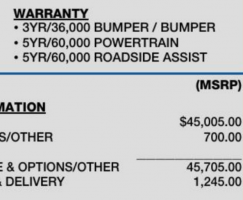
— A Ford destination charge lawsuit is over for now after a California vehicle owner claimed she didn't know Ford made a profit from the destination and delivery fee charged to deliver a new vehicle to a dealership.
California plaintiff Mary Hawkins purchased a new 2019 Lincoln MKX in July 2019 and filed the destination charge lawsuit on May 20, 2021.
The plaintiff says she saw the Monroney sticker (window label) on the vehicle before she purchased the Lincoln. The window sticker listed a line-item charge for a “Destination & Delivery” fee of $995.
The plaintiff says she believed the destination fee was a nonnegotiable charge she was required to pay because it was the cost for Ford to deliver the vehicle to the dealership.
But according to the class action lawsuit, Ford misrepresented the destination charge as the amount to deliver the vehicle. The plaintiff says the Ford destination charge includes a profit to Ford, and if she would have known this she would not have purchased the vehicle or would have paid significantly less.
"Plaintiff alleges that she has suffered ascertainable loss as a result of Ford’s omissions and misrepresentations associated with the fee, including but not limited to overpaying for the vehicle. — Ford destination charge lawsuit
Ford's Motion to Compel Arbitration in the Destination Charge Lawsuit
Ford filed a motion to compel arbitration and to dismiss the destination charge lawsuit by arguing the sales agreement specifically includes a valid and enforceable arbitration clause.
"Any claim or dispute, whether in contract, tort, statute, or other (including the interpretation and scope of this Arbitration Provision, and the arbitrability of the claim or dispute), between you and us or our employees, agents, successors or assigns, which arises out of or relates to your credit application, purchase or condition of this vehicle, this contract or any resulting transaction or relationship (including any such relationship with third parties who do not sign this contract) shall, at your or our election, be resolved by neutral, binding arbitration and not by a court action."
Judge Jesus G Bernal found the total sales price is noted in the sales agreement along with the total cash price of the vehicle. The judge also says the plaintiff doesn't allege there is anything wrong with the vehicle and never mentions any defects.
Jesus G Bernal granted Ford's motion to compel arbitration and to stay the litigation. Ford's motion to dismiss the class action was denied as moot, and future hearings were vacated.
The Ford destination charge lawsuit was filed in the U.S. District Court for the Central District of California: Mary Hawkins v. Ford Motor Company.
The plaintiff is represented by Kaliel Gold PLLC, and Kopelowitz Ostrow Ferguson Weiselberg Gilbert.
A similar General Motors destination charge class action lawsuit was dismissed after the automaker argued it did nothing deceptive because the destination charge information was fully disclosed on the window sticker for all potential buyers to see before they made their buying decision.
The judge dismissed the General Motors class action lawsuit by ruling average consumers wouldn't be surprised to learn the price of goods often includes a profit for the seller. The judge also found the words "destination charge" do not imply an absence of profit for GM.
Additionally, the judge said a reasonable customer wouldn't expect a destination charge to exclude a profit from the automaker.




